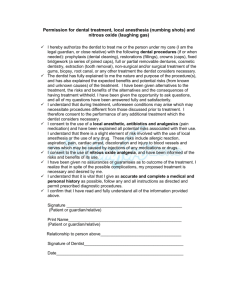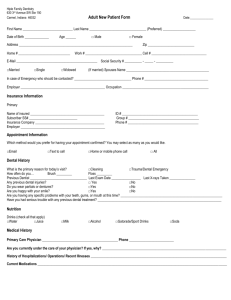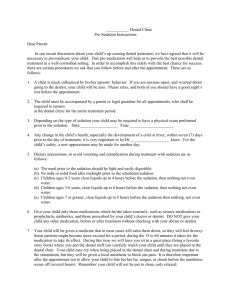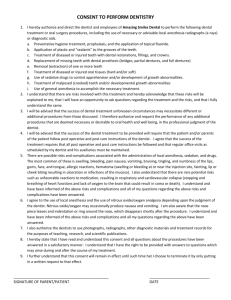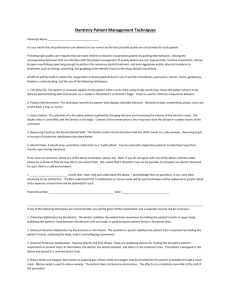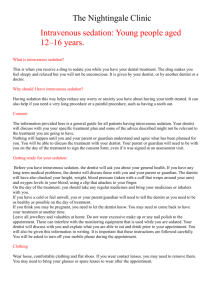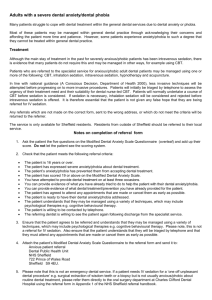Dental Relaxation - Total Care Dental
advertisement
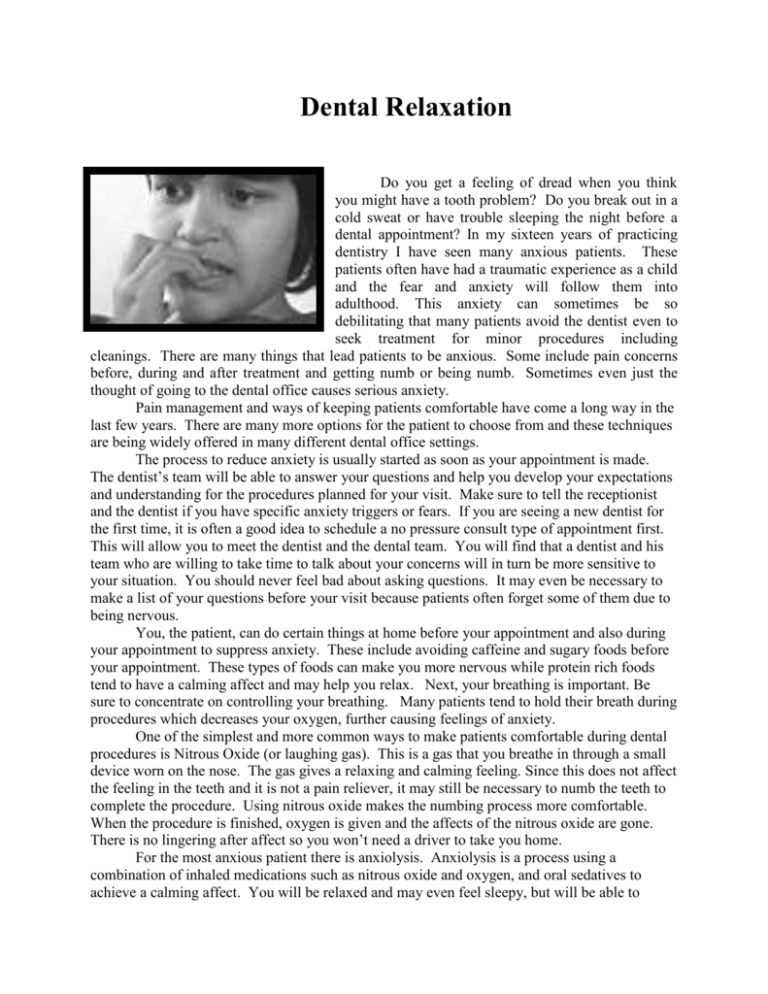
Dental Relaxation Do you get a feeling of dread when you think you might have a tooth problem? Do you break out in a cold sweat or have trouble sleeping the night before a dental appointment? In my sixteen years of practicing dentistry I have seen many anxious patients. These patients often have had a traumatic experience as a child and the fear and anxiety will follow them into adulthood. This anxiety can sometimes be so debilitating that many patients avoid the dentist even to seek treatment for minor procedures including cleanings. There are many things that lead patients to be anxious. Some include pain concerns before, during and after treatment and getting numb or being numb. Sometimes even just the thought of going to the dental office causes serious anxiety. Pain management and ways of keeping patients comfortable have come a long way in the last few years. There are many more options for the patient to choose from and these techniques are being widely offered in many different dental office settings. The process to reduce anxiety is usually started as soon as your appointment is made. The dentist’s team will be able to answer your questions and help you develop your expectations and understanding for the procedures planned for your visit. Make sure to tell the receptionist and the dentist if you have specific anxiety triggers or fears. If you are seeing a new dentist for the first time, it is often a good idea to schedule a no pressure consult type of appointment first. This will allow you to meet the dentist and the dental team. You will find that a dentist and his team who are willing to take time to talk about your concerns will in turn be more sensitive to your situation. You should never feel bad about asking questions. It may even be necessary to make a list of your questions before your visit because patients often forget some of them due to being nervous. You, the patient, can do certain things at home before your appointment and also during your appointment to suppress anxiety. These include avoiding caffeine and sugary foods before your appointment. These types of foods can make you more nervous while protein rich foods tend to have a calming affect and may help you relax. Next, your breathing is important. Be sure to concentrate on controlling your breathing. Many patients tend to hold their breath during procedures which decreases your oxygen, further causing feelings of anxiety. One of the simplest and more common ways to make patients comfortable during dental procedures is Nitrous Oxide (or laughing gas). This is a gas that you breathe in through a small device worn on the nose. The gas gives a relaxing and calming feeling. Since this does not affect the feeling in the teeth and it is not a pain reliever, it may still be necessary to numb the teeth to complete the procedure. Using nitrous oxide makes the numbing process more comfortable. When the procedure is finished, oxygen is given and the affects of the nitrous oxide are gone. There is no lingering after affect so you won’t need a driver to take you home. For the most anxious patient there is anxiolysis. Anxiolysis is a process using a combination of inhaled medications such as nitrous oxide and oxygen, and oral sedatives to achieve a calming affect. You will be relaxed and may even feel sleepy, but will be able to communicate with the dentist and receive and follow instructions from the dentist. You are not really aware of the procedure being performed and likely will not remember much of the appointment the following day. Another option in some dental offices is using intravenous (IV) sedation. This type of sedation requires the dental provider to have additional specialized training. It is necessary to have a driver bring you and take you home when using both of these sedation methods. Sedation is very safe when administered properly by a trained professional. As with any procedure, you should discuss the risks and benefits with your doctor and your dentist to make sure you are a good candidate for sedation dentistry. In my office I offer nitrous oxide alone as well as in combination with oral sedatives and have found them to be extremely effective in helping my most anxious patients complete their restorative and maintenance needs while being totally relaxed. I often have people say they would not be able to have their work done if not for the sedation techniques used in my office. If you are dealing with anxiety and fear about going to the dentist call today for a consultation to discuss your particular needs and concerns. Our dental team will be most happy to answer your questions. It is possible to have your dental work done in complete comfort. Dr. Wollschlager has had many hours of continuing education at DOCS Education for conscious sedation.

